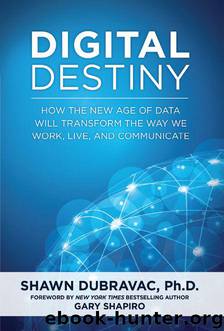Digital Destiny: How the New Age of Data Will Transform the Way We Work, Live, and Communicate by Shawn DuBravac

Author:Shawn DuBravac [DuBravac, Shawn]
Language: eng
Format: epub
ISBN: 9781621573807
Publisher: Regnery Publishing
Published: 2015-01-12T08:00:00+00:00
FROM SCARCITY TO ABUNDANCE
Since the days of the ancient poets and playwrights, one characteristic has defined entertainment for mankind: scarcity. In ancient times, the cost of paper and the written word precluded an abundance of poets and writers. Only the best were published—and only the best have come down to us thousands of years later. So too with playwrights. There were only so many festivals and theater productions each year at which playwrights could showcase their skills. Only the best competed against one another in ancient Athens, and only the best created works survive to this day.
It has been no different in modern times. Of the thousands of books that are submitted to publishers every year, only a fraction ever see print. Of the thousands of screenplays that get written, only a fraction become movies. There is a limited amount of shelf space in the bookstores and theaters in the world. Only the best make it there; the rest are never seen.
In an analog world we attempted to overcome these constraints by increasing the volume of whatever the scarce resource was. So we went from single-screen theaters to dual-screen theaters to multiplexes with ten or more screens. In publishing, the Internet eliminated some of the scarcity of the bookshelf, but as long as publishers were still using printers and paper and ink, there remained a scarcity of resources. In either case, the scarcity was perhaps improved, but it remained a scarcity.
In an analog world, the limiting factors of scarcity dictate the choices individuals make. Consumers only see and read what has already been decided by an elite class of publishers and producers to be the best (or at least the most profitable). These elite gatekeepers determined what was on our shelves, on our television screens, and in our theaters. Consumers did dictate which of those works that made it past the gatekeepers would be successful, but they were starting from a selection that had already been greatly winnowed by others.
In his seminal 2004 Wired article “The Long Tail,”3 which he expanded into a book, Chris Anderson called this winnowing process “the tyranny of lowest-common-denominator fare,” by which he meant that economics—not quality—determined what we know as popular culture. Scarcity dictated what theater and bookstore owners would stock. If a product couldn’t pay its shelf-space “rent,” it was discontinued. Of course this doesn’t mean that the product in question wasn’t good or popular with some—it just wasn’t popular enough.
The same is true for analog radio and television. There are only so many stations, and each can broadcast only a set number of hours of programming. “[T]he tyranny of lowest-common-denominator fare” demands that in such a world only those programs that attract the most ears or eyeballs will be broadcast.
Of course the problem is, as Anderson wrote, that “everyone’s taste departs from the mainstream somewhere.” Whatever movie is the biggest summer hit, whatever book is No. 1 on the New York Times best-seller list, or whatever television show gets the best Nielsen ratings week after week.
Download
This site does not store any files on its server. We only index and link to content provided by other sites. Please contact the content providers to delete copyright contents if any and email us, we'll remove relevant links or contents immediately.
| Anthropology | Archaeology |
| Philosophy | Politics & Government |
| Social Sciences | Sociology |
| Women's Studies |
The Secret History by Donna Tartt(19052)
The Social Justice Warrior Handbook by Lisa De Pasquale(12187)
Thirteen Reasons Why by Jay Asher(8893)
This Is How You Lose Her by Junot Diaz(6877)
Weapons of Math Destruction by Cathy O'Neil(6264)
Zero to One by Peter Thiel(5786)
Beartown by Fredrik Backman(5737)
The Myth of the Strong Leader by Archie Brown(5499)
The Fire Next Time by James Baldwin(5431)
How Democracies Die by Steven Levitsky & Daniel Ziblatt(5215)
Promise Me, Dad by Joe Biden(5141)
Stone's Rules by Roger Stone(5081)
A Higher Loyalty: Truth, Lies, and Leadership by James Comey(4954)
100 Deadly Skills by Clint Emerson(4921)
Rise and Kill First by Ronen Bergman(4779)
Secrecy World by Jake Bernstein(4741)
The David Icke Guide to the Global Conspiracy (and how to end it) by David Icke(4702)
The Farm by Tom Rob Smith(4502)
The Doomsday Machine by Daniel Ellsberg(4484)
